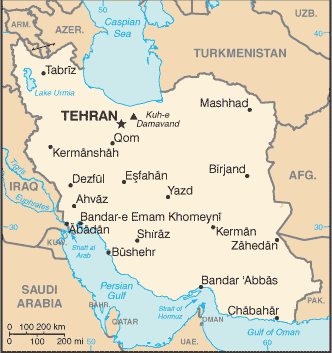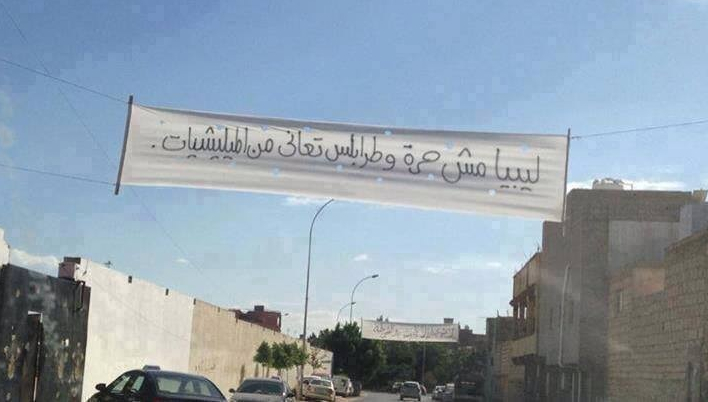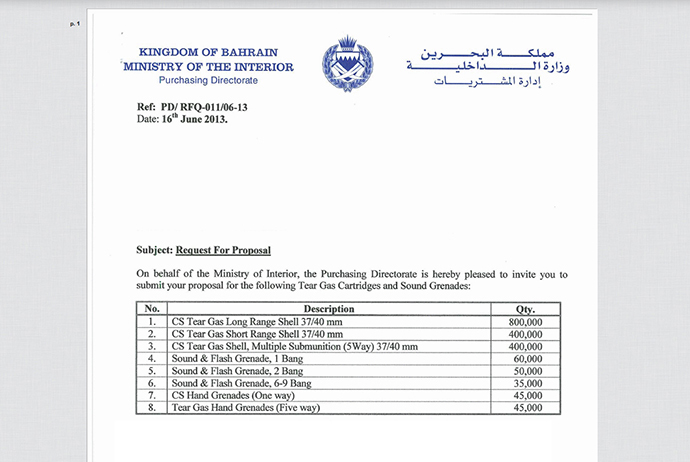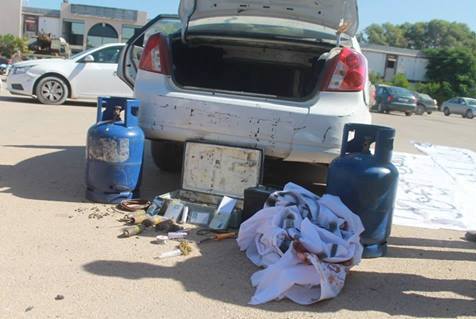Bahrain’s enormous tear gas tender exposed amid ongoing unrest
Demonstrators protesting the death of an activist were teargassed near Bahrain’s capital on Wednesday, as human rights groups slam the country’s crowd-dispersal policies following release of a leaked government tender for riot control weaponry supplies.
Bahrain’s Ministry of the Interior issued a tender in June, seeking supplies of 1.6 million tear gas canisters and 145,000 stun grenades, according to a document obtained by UK based rights group Bahrain Watch. The number of tear gas shells appears to be greater than the country’s population of 1.2 million.
The watchdog has alleged South Korean companies could be most likely bidders, taking into account they have a record of supplying tear gas to Bahrain.
South Korea’s DaeKwang Chemical acknowledged it exported around 1 million units of tear gas to Bahrain between 2011 and 2012 according to Kim Jong-bae, a senior executive at the group, cited by the Financial Times.
Bahrain Watch has launched an online campaign, calling on internet users to bombard the companies exporting tear gas to Bahrain and the authorities approving such sales with condemnatory emails.
“Tear gas is supposed to be 'non-lethal', but Bahrain's police use large amounts of tear gas in residential areas, even when there are no protests, and sometimes shoot tear gas directly into houses. The police also fire the canisters directly at people's heads, which has caused serious injuries and deaths,” the text of the message reads. It had already been sent about 30,000 times by the time this article was published.
South Korea’s DaeKwang Chemical acknowledged it exported around 1 million units of tear gas to Bahrain between 2011 and 2012 according to Kim Jong-bae, a senior executive at the group, cited by the Financial Times.
Bahrain Watch has launched an online campaign, calling on internet users to bombard the companies exporting tear gas to Bahrain and the authorities approving such sales with condemnatory emails.
“Tear gas is supposed to be 'non-lethal', but Bahrain's police use large amounts of tear gas in residential areas, even when there are no protests, and sometimes shoot tear gas directly into houses. The police also fire the canisters directly at people's heads, which has caused serious injuries and deaths,” the text of the message reads. It had already been sent about 30,000 times by the time this article was published.
Signatories to the message have been welcome to share their own stories of tear gas exposure.
“I live in Sehla – Bahrain. Tear gas became a daily routine that we got used to, I would never dare open the window driving into town, knowing that I could suffocate and drive into a lamp post on the way. My wife is pregnant and we bought gas masks and put them in our cars,” one of such stories by a user named Anon reads at the campaign’s web-page.
Other rights groups joined the campaign. Human Rights Watch reacted by saying that Bahraini security forces had “repeatedly used tear gas disproportionately and sometimes unlawfully in suppressing antigovernment demonstrations,” according to The New York Times.
“I live in Sehla – Bahrain. Tear gas became a daily routine that we got used to, I would never dare open the window driving into town, knowing that I could suffocate and drive into a lamp post on the way. My wife is pregnant and we bought gas masks and put them in our cars,” one of such stories by a user named Anon reads at the campaign’s web-page.
Other rights groups joined the campaign. Human Rights Watch reacted by saying that Bahraini security forces had “repeatedly used tear gas disproportionately and sometimes unlawfully in suppressing antigovernment demonstrations,” according to The New York Times.
Another watchdog, Human Rights First has called on Washington to intervene and slam the sales. The US itself stopped exports of tear gas to Bahrain in 2012 because of human rights concerns.
“Tear gas is being used in an indiscriminate, inappropriate and lethal way. The US should publicly oppose all sales of tear gas to Bahrain while it is being abused by the police,” said Brian Dooley of Human Rights First.
Bahrain has seen regular opposition rallies since the beginning of the Arab Spring in February 2011. It has on many occasions been criticized for excessive use of force in handling riots. According to estimates by Physicians for Human Rights 39 deaths in Bahrain over two-and-a-half years were caused by tear gas.
Tear gas was most recently used to disperse crowds which clashed with police in Bahrain on Wednesday in a village near capital Manama, at the funeral of 17-year-old Ali Khalil Sabbagh. Protesters claim he was shot by police, which argues the teenager was a terrorist and died when a bomb that he was making exploded.
“Tear gas is being used in an indiscriminate, inappropriate and lethal way. The US should publicly oppose all sales of tear gas to Bahrain while it is being abused by the police,” said Brian Dooley of Human Rights First.
Bahrain has seen regular opposition rallies since the beginning of the Arab Spring in February 2011. It has on many occasions been criticized for excessive use of force in handling riots. According to estimates by Physicians for Human Rights 39 deaths in Bahrain over two-and-a-half years were caused by tear gas.
Tear gas was most recently used to disperse crowds which clashed with police in Bahrain on Wednesday in a village near capital Manama, at the funeral of 17-year-old Ali Khalil Sabbagh. Protesters claim he was shot by police, which argues the teenager was a terrorist and died when a bomb that he was making exploded.
Syria.......
Inspectors: Syria Chemical Disarmament Deadline Will Be Met
By Nov 1 Syria Won't Be Able to Make Chemical Arms
by Jason Ditz, October 23, 2013
Inspectors from the Organization for the Prohibition of Chemical Weapons (OPCW) have once again offered an assessment of their ongoing disarmament operations in Syria, reporting that they are on pace to easily meet the first major milestone.
 That milestone is to have destroyed all equipment in Syria that is used for the production and mixing of chemical arms, and the UN imposed timetable gave the OPCW until November 1 to get it done.
That milestone is to have destroyed all equipment in Syria that is used for the production and mixing of chemical arms, and the UN imposed timetable gave the OPCW until November 1 to get it done.
This means that by the end of October Syria will no longer have any ability to mix weapons out of their precursors, nor any ability to load weaponized chemicals into warheads.
The OPCW is overseeing the destruction, but it is the Syrians themselves who are actually doing it. The reports are that the destruction of equipment is mostly centering around smashing stuff with hammers, and filling mixing vats with concrete so they can’t be used.
The OPCW has visited 18 of Syria’s 23 sites, and the only real obstacle to any of the deadlines seems to be that the ongoing civil war may make certain sites, closer to contested territory, difficult to access.
Iran.......
Iran Halts 20 Percent Uranium Enrichment
MP: Iran Doesn't Need Any More
by Jason Ditz, October 23, 2013
The Iranian government has reportedly halted the production of 20 percent enriched uranium, by far the highest level enrichment ongoing in the country.
 Iran began producing 20 percent uranium in 2010 when efforts to secure fuel for the US-built Tehran Research Reactor (TRR) fell through, and they began to attempt to produce fuel rods for themselves. The TRR provides materially all of Iran’s medical isotopes for nuclear medicine.
Iran began producing 20 percent uranium in 2010 when efforts to secure fuel for the US-built Tehran Research Reactor (TRR) fell through, and they began to attempt to produce fuel rods for themselves. The TRR provides materially all of Iran’s medical isotopes for nuclear medicine.
Deputy head of the Iranian parliament National Security Committee Hossein Hosseini reported that Iran no longer needs to produce 20 percent uranium because it already has enough to make all the fuel rods the TRR will need for the foreseeable future.
Initially installed in 1967, the TRR was initially designed to run on weapons-grade (92%) uranium, but was converted to use 20 percent by an Argentine company in 1987.
The under construction Arak Reactor, which uses unenriched uranium, would eventually replace the TRR as the primary source of medical and industrial isotopes, though it is likely still quite some way from being operational at those levels.
The end of 20 percent uranium enrichment was a key demand of Western nations in any nuclear deal and will likely improve the chances for progress at upcoming nuclear talks, though Israel in particular has sought to shift discussion away from the increasingly irrelevant issue and start demanding concessions on Iran’s remaining 3.5 percent enrichment and the rest of its civilian program.
Libya.......
Libya pays for Abu Anas’ NY legal team
Hadi Fornaji.

Bernard V. Kleinman, Abu Anas’ Libyan-hired lawyer
Tripoli, 23 October 2013:
Libya is paying for the legal team defending kidnapped Libyan Abu Anas against US charges that he assisted in the 1998 Al-Qaeda attacks of the US embassies in Kenya and Tanzania.
The lawyer, Bernard V. Kleinman apparently declined to comment on reports that he had been retained by the Libyan embassy in Washington. Kleinman is a highly regarded civil rights lawyer. He is a member of team of lawyers that have been appointed to represent Guantanamo detainees in the much-criticised military courts that have been set up to try them.
In 2010 Kleinman acted on behalf of Ramzi Ahmed Yousef, the convicted bomber and mastermind behind the 1993 World Trade Centre bombing. Yousef was appealing for better conditions and facilities at Guantanamo, where he is serving a sentence of life plus 240 years.
Yesterday, when Abu Anas made his second appearance in the New York court before Judge Lewis Kaplan, Kleinman moved that the start of the trial be delayed for six months, while the defence team studied the 270,000 pages of evidence which chief prosecutor Nicholas Lewin told the court had been assembled.
The judge did not rule on Kleinman’s submission. Instead he heard a request from the prosecutor that Abu Anas be joined in the trial of two other suspected Al-Qaeda leaders, also charged with involvement in the East African embassy bombings. Prosecutions against Khalid Fawwaz and Adel Abdul Bari were launched a year ago. The judge gave Kleinman until 20 December to respond to the prosecution’s plan.
Despite concerns from his son Abdullah Rugaii, that his health was worsening through hepatitis and a hunger strike, Abu Anas reportedly looked tired by well.
On Liberation Day, some Libyans still don’t feel liberated
Maha Ellawati and Aimen Eljali

“Libya is not free. Tripoli is under the militias” banner in Dahra today (Photo: Aimen Eljali)
Benghazi/Tripoli, 23 October 2013:
Libyans may have been given today as a public holiday to celebrate the second anniversary of the Liberation, but the day has been notable for an almost total lack of festivities in Tripoli and Benghazi.
Organisers put out tables and chairs in Martyrs Square this evening for a party to which no one came. In Benghazi, there were none of the triumphant mass demonstrations that its citizens have mounted in the past. Instead a group of some 30 protestors paraded outside the Tibesti Hotel with placards saying that Libya was still not liberated.
A few districts had banners with similar messages draped across the street. In Tripoli, near the Dahra cemetery, the street banner read: “Libya is not free, Tripoli is under the militias”.
The silent protest against insecurity and the militias continued into this evening. Libyans have never missed an excuse to let off celebratory fireworks, or even an RPG or two if no fireworks are to hand. Certainly tonight however, behind the seafront Sha’ab region of the capital, there was hardy a firework to be heard.
Car bomb diffused at Tripoli West power station
By Ashraf Abdul-Wahab.
Tripoli, 24 October 2013:
A car bomb was found and diffused outside Tripoli West power station in Janzour yesterday morning.
It was discovered following an incident at a nearby bridge over the coast road, when a patrol of the National Mobile Force came under fire from a vehicle thought to be involved in an attempt to block the road with burning tyres.
Two members of the force were wounded, one of whom was shot in the chest and had to be transferred to Tunisia for treatment.
The National Mobile Force is a new body under the joint control of the Ministries of Defence and Interior
While combing the area afterwards, the force discovered an abandoned white Chevrolet with no number plates next to the power station perimeter wall. Inside were the explosives and gas cylinders. Had it exploded, members of the force told the Libya Herald, it could have done substantial damage. They said tat power station fuel tanks were close by on the other side of the wall.
It is reported that the force is still on high alert and are combing the area to try to locate the assailants and clues as to who was behind the car bomb.




No comments:
Post a Comment